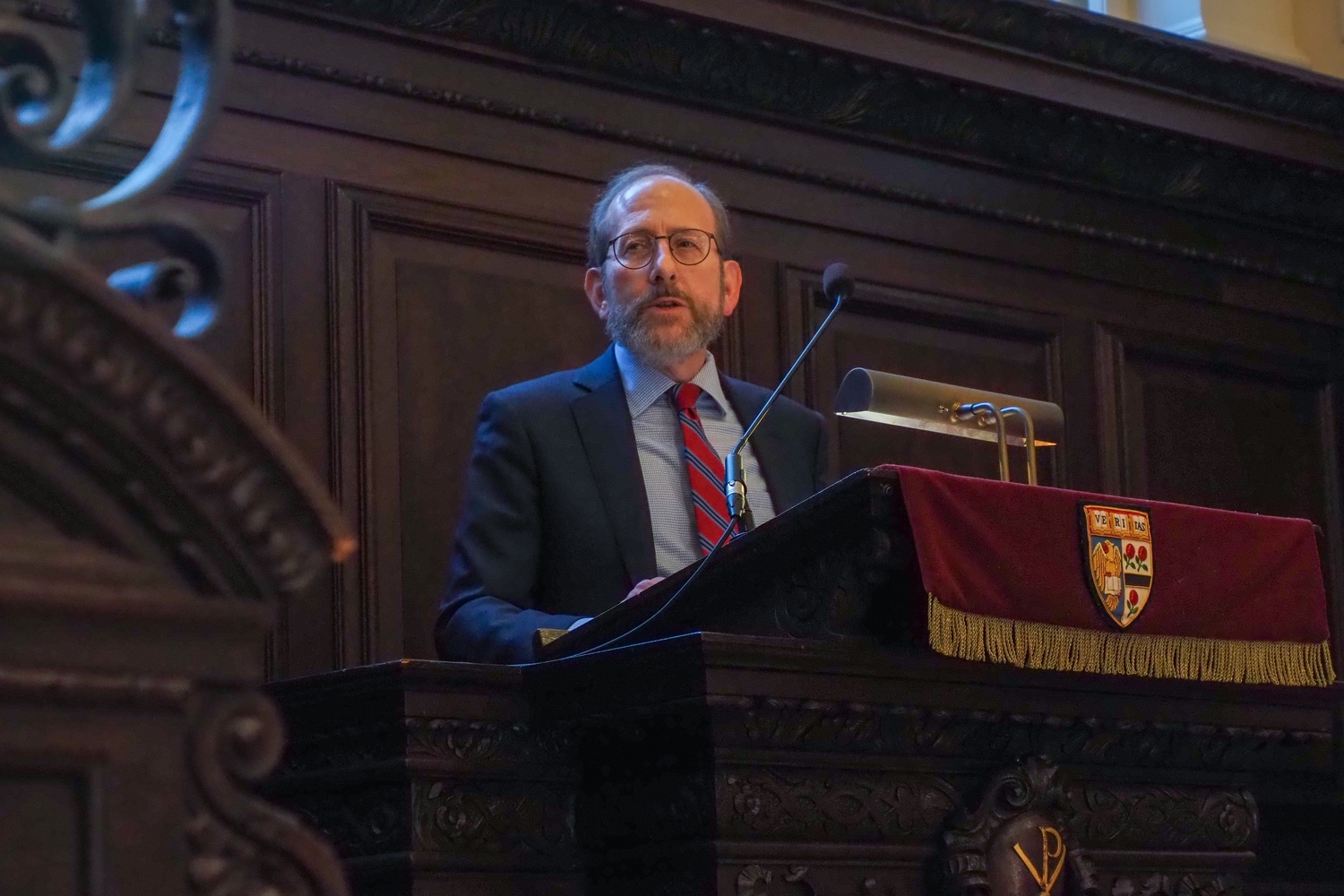
News
Summers Will Not Finish Semester of Teaching as Harvard Investigates Epstein Ties

News
Harvard College Students Report Favoring Divestment from Israel in HUA Survey

News
‘He Should Resign’: Harvard Undergrads Take Hard Line Against Summers Over Epstein Scandal

News
Harvard To Launch New Investigation Into Epstein’s Ties to Summers, Other University Affiliates

News
Harvard Students To Vote on Divestment From Israel in Inaugural HUA Election Survey
Garber Asks Affiliates to Defend Harvard in First Day of Classes Sermon

Harvard President Alan M. Garber ’76 called on affiliates to stand with the University as it fights the Trump administration in court in an address at Memorial Church Tuesday morning, warning that higher education will not survive without active support from its members.
“When confusion and hurry and a host of other calamities threaten to overwhelm them,” Garber said from the pulpit during Morning Prayers, “it’s up to us, the beneficiaries of the greatness and endurance of institutions, to defend and protect them, to steady and ready them, so that they might continue to thrive.”
Garber’s brief remarks — which follow in a tradition of presidential addresses on the first day of class — came just one day before a federal court is expected to rule in Harvard’s lawsuit against the Trump administration, which has frozen nearly $2.7 billion in federal funding and sought sweeping oversight of admissions, curriculum, and governance on campus. Though the court is likely to side with Harvard, the Justice Department has indicated it will appeal — setting the stage for a protracted legal fight.
Harvard is also in settlement talks with federal officials to reinstate the funding without a court ruling.
The University is now considering a $500 million payment to lift the freeze — a figure first demanded by President Donald Trump and previously rejected in private by Garber.
But before the early morning churchgoers, Garber did not mention Trump, the pending court ruling, or the negotiations directly. Instead, alluding only to “events outside our control” shaping a “challenging” year ahead, Garber framed his message as a call to action for the campus community.
“May this bring opportunities for us to affirm and fulfill the commitment to Veritas that unites and strengthens us as an institution and as a community,” he said.
Over the summer, the Trump administration intensified its pressure campaign against Harvard, levying new threats against the University’s accreditation, demanding records relating to misconduct on campus by international students, and formally issuing a finding that Harvard violated Title VI.
In his inaugural first day of classes address last fall, Garber used the same forum to acknowledge campus divisions and urge affiliates to “embrace each other” after a semester marked by pro-Palestine protests on campus. But this year, his tone shifted towards institutional preservation, casting universities as spaces where intellectual disagreement must be protected, not politicized.
“Though our efforts often lead to affirmation and agreement, they begin with confrontation and debate fueled by a shared desire for deeper and richer understanding,” he said.
Garber, who is Jewish, also said that his experience debating the meaning and application of the Torah alongside colleagues taught him the value of disagreement in pursuit of the truth.
“Academic institutions, like religious institutions, depend on our passion to seek truth,” he said.
Garber’s framing offered a quiet rebuttal to conservative critics in Washington who have long accused Harvard of lacking ideological diversity and suppressing conservative thought. While he did not engage those claims directly, he defended disagreement as a vital institutional norm.
“Institutions challenge us to resist our inclinations, to confront our assumptions, and to develop the capacity to explore different views with the seriousness they deserve,” Garber said.
“What do they need from us in return? They need our commitment,” he added.
—Staff writer Dhruv T. Patel can be reached at dhruv.patel@thecrimson.com. Follow him on X @dhruvtkpatel.
—Staff writer Avani B. Rai can be reached at avani.rai@thecrimson.com. Follow her on X @avaniiiirai.
Want to keep up with breaking news? Subscribe to our email newsletter.
